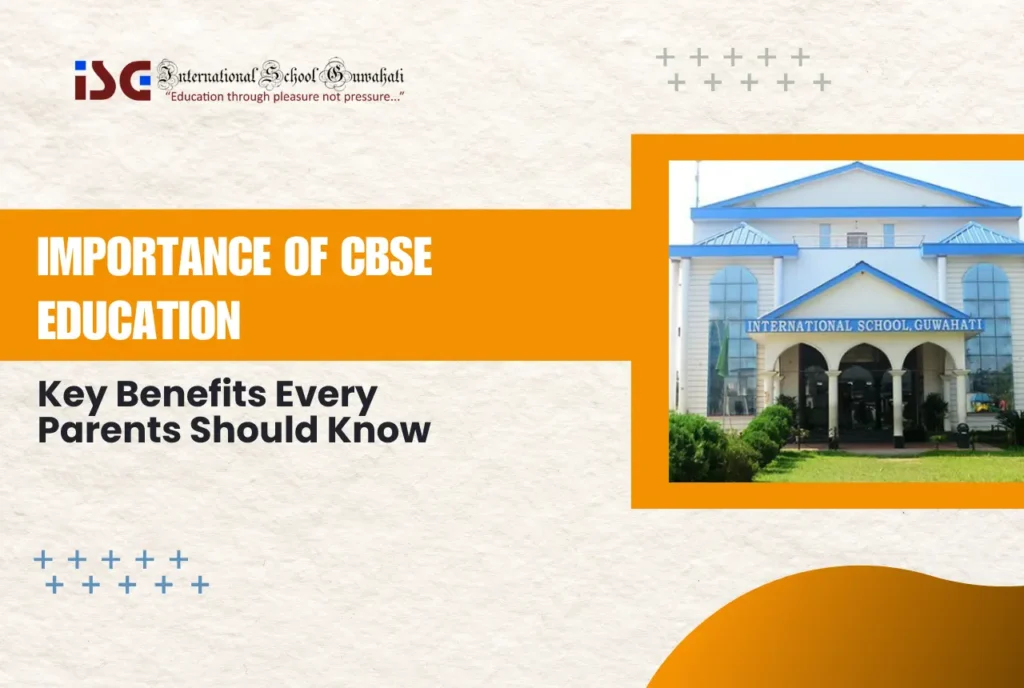India boasts a rich tapestry of the importance of CBSE educational boards, each catering to specific needs and philosophies.
Among these, the Central Board of Secondary Education (CBSE) stands out as a prominent national board, shaping the academic journeys of millions of students.
Choosing the right educational path for your child is crucial, and understanding the advantages of CBSE can be a valuable step in this decision-making process.
This article delves into five key benefits of a CBSE education: a standardized and well-structured curriculum, a focus on holistic development, strong preparation for competitive exams, nationwide portability, and recognition by higher education institutions.
By exploring these aspects, you’ll gain a deeper understanding of how CBSE equips students for success in academics, personal growth, and their future endeavors.
Importance of CBSE Education: 5 Key Benefits for Students
1. Standardized Curriculum and Nationwide Recognition

When there is uniformity in the set of learning objectives, content areas, and teaching methodologies followed by all affiliated schools it is called a standardized curriculum.
By following this consistency there are multiple advantages that it offers. These are as follows –
- Firstly, ensuring all students, regardless of location, will always receive a well-structured foundation in the core subjects.
- Secondly, it is highly beneficial in the context of India’s vast educational landscape.
By maintaining a consistent framework across the country, and guaranteeing a certain level of quality education for all CBSE students, all of this is possible as the CBSE curriculum exemplifies this standardization.
After the implementation of this uniformity, it also simplifies the transfer process between schools, as students seamlessly adapt to the established learning style.
Another significant advantage of CBSE is its national recognition. Higher education institutions across India typically accept CBSE degrees due to the board’s well-established reputation.
This guarantees a seamless transition to the subsequent academic level and removes any worries over curricular disparities.
Furthermore, having a CBSE foundation removes the necessity for pupils thinking about moving to India to acclimate to an entirely new curriculum.
State board curriculam, on the other hand, could differ greatly between states even while they offer regional relevance.
Students switching schools across state boundaries may encounter difficulties as a result of this disparity.
2. Strong Foundation in Core Subjects

A strong foundation is essential for future academic success, especially in core subjects like Mathematics, Science, Social Studies, and Languages.
Providing the building blocks for critical thinking, problem-solving, and analytical skills, these subjects are necessary for various academic disciplines and real-world applications.
The CBSE course and curriculum especially in India places a strong emphasis on the core subjects.
It is known to emphasize a comprehensive understanding of fundamental concepts, encouraging students to go beyond rote memorization and develop a deeper grasp of the subject matter.
This emphasis develops curiosity and scientific temperament in pupils by providing them with fundamental knowledge in a variety of subjects.
Mathematical problem-solving strategies develop into transferable abilities that can be used in a variety of subjects.
In social studies, analyzing historical events develops critical thinking skills and a grasp of societal institutions.
The development of effective communication skills through language study is extremely beneficial for future employment and academic endeavors.
When it comes to basic topics, CBSE provides a slightly more simplified approach than some other boards, such as ICSE.
Students aiming for difficult entrance examinations or those who prefer a structured curriculum with a clear emphasis on core knowledge may benefit from this concentration.
3. Benefits of CBSE Schooling for Competitive Exams

In India, competitive entrance exams like JEE (engineering) and NEET (medicine) serve as gateways to prestigious institutions and coveted careers.
These exams demand a strong foundation in core subjects and the ability to think critically and apply knowledge.
The CBSE curriculum excels in preparing students for such challenges. There’s a strong emphasis on Science, Mathematics, and English, subjects that form the backbone of many competitive exams.
Moreover, the curriculum fosters analytical thinking and problem-solving skills, essential for cracking these exams.
CBSE schools further equip students with valuable resources and guidance. Many schools offer dedicated coaching classes or partner with coaching institutes to provide additional support.
Teachers are often well-versed in the exam patterns and can tailor their teaching methods to address specific competitive exam requirements.
When compared to some state boards, the CBSE approach offers a more focused advantage for competitive exams.
While some state boards may have their merit, they might not have the same level of inherent alignment with these high-stakes entrance exams.
This can necessitate additional effort from students to bridge the gap between their board curriculum and the competitive exam syllabus.
4. Focus on Holistic Development

Fostering a child’s mental, physical, social, and emotional well is referred to as holistic development.
It acknowledges that education goes beyond textbooks and seeks to develop well-rounded people who can succeed in all facets of life.
This idea is embraced by CBSE schools, which offer a platform for overall growth in addition to academics.
Students are strongly encouraged to get involved in extracurricular activities such as debate groups, theater, music, and sports. These exercises help pupils develop vital life skills while also giving them a healthy outlet.
Playing sports promotes sportsmanship, discipline, and teamwork. Creativity, self-expression, and emotional intelligence are all fostered by artistic endeavors.
Furthermore, the curriculum of CBSE schools frequently includes workshops or programs on life skills. These classes may address subjects like mental health awareness, communication techniques, or financial literacy, preparing pupils to deal with the challenges of life after school.
By encouraging these diverse activities, CBSE schools foster well-rounded individuals who are not just academically strong but also confident, adaptable, and well-equipped to handle the challenges and opportunities that lie ahead.
5. Continuous Improvement and Updated Curriculum

The CBSE curriculum isn’t static. Recognizing the need to adapt to a dynamic world, the board regularly reviews and updates its content to stay relevant to current trends and prepare students for the future.
This ensures students are exposed to the latest knowledge and skills required for success in the 21st century.
One key focus area is the integration of life skills. The curriculum incorporates workshops or lessons on topics like financial literacy, communication skills, and critical thinking. This equips students to navigate real-world challenges beyond the classroom.
Additionally, CBSE emphasizes technology integration, encouraging the use of digital tools and resources in the learning process. This prepares students for a world increasingly reliant on technology.
The curriculum also prioritizes value education, fostering ethical values, social responsibility, and environmental consciousness. This holistic approach aims to develop responsible global citizens.
Compared to some state boards, CBSE’s approach to curriculum updates demonstrates a more proactive stance.
While some state boards may eventually update their curriculums, CBSE’s commitment to regular reviews ensures students have access to the most relevant and up-to-date content, better preparing them for the ever-evolving world
Additional Considerations for Parents
While CBSE offers a multitude of benefits, it’s natural for parents to have concerns. A common worry is the potential for academic pressure and workload.
It’s important to choose a CBSE school that promotes a healthy balance between academics and extracurricular activities. Look for schools that offer opportunities for sports, arts, and relaxation to avoid student burnout.
Open communication with teachers and counselors can also help manage workload effectively.
When selecting a CBSE school, consider several factors beyond the curriculum. Location, for instance, impacts commute times.
More importantly, research the faculty’s qualifications and experience. A strong faculty is essential for delivering the curriculum effectively.
Look for a school with well-equipped libraries, labs, and sports facilities to support a holistic learning environment.
Finally, consider the school’s philosophy and teaching methods. Ideally, the school’s approach should align with your child’s learning style and interests.
CBSE isn’t the only educational path in India. State boards offer curriculums more specific to your region.
International boards like IB and IGCSE provide a global perspective but may have limited acceptance in some Indian universities.
Ultimately, the best board depends on your child’s individual needs and your long-term educational goals.
Conclusion
The CBSE education system offers a multitude of advantages, fostering academic excellence, holistic development, and preparation for competitive exams.
The standardized curriculum ensures quality education across the country, while its nationwide recognition smooths transitions between schools and universities.
CBSE schools excel at equipping students for success, not just in exams but also in life, by integrating life skills, technology, and value education.
Choosing the right educational board is a crucial decision.
While CBSE presents a compelling option, it’s important to consider your child’s individual needs and aspirations. State boards offer regional relevance, while international boards provide a global perspective.








